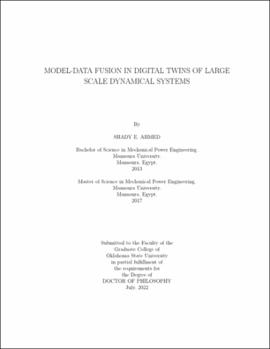| dc.contributor.advisor | San, Omer | |
| dc.contributor.author | Ahmed, Shady E. | |
| dc.date.accessioned | 2023-04-05T16:20:59Z | |
| dc.date.available | 2023-04-05T16:20:59Z | |
| dc.date.issued | 2022-07 | |
| dc.identifier.uri | https://hdl.handle.net/11244/337289 | |
| dc.description.abstract | Digital twins (DTs) are virtual entities that serve as the real-time digital counterparts of actual physical systems across their life-cycle. In a typical application of DTs, the physical system provides sensor measurements and the DT should incorporate the incoming data and run different simulations to assess various scenarios and situations. As a result, an informed decision can be made to alter the physical system or at least take necessary precautions, and the process is repeated along the system's life-cycle. Thus, the effective deployment of DTs requires fulfilling multi-queries while communicating with the physical system in real-time. Nonetheless, DTs of large-scale dynamical systems, as in fluid flows, come with three grand challenges that we address in this dissertation. | |
| dc.description.abstract | First, the high dimensionality makes full order modeling (FOM) methodologies unfeasible due to the associated computational time and memory costs. In this regard, reduced order models (ROMs) can potentially accelerate the forward simulations by orders of magnitude, especially for systems with recurrent spatial structures. However, traditional ROMs yield inaccurate and unstable results for turbulent and convective flows. Therefore, we propose a hybrid variational multi-scale framework that benefits from the locality of modal interactions to deliver accurate ROMs. Furthermore, we adopt a novel physics guided machine learning technique to provide on-the-fly corrections and elevate the trustworthiness of the resulting ROM in the sparse data and incomplete governing equations regimes. | |
| dc.description.abstract | Second, complex natural or engineered systems are characterized by multi-scale, multi-physics, and multi-component nature. The efficient simulation of such systems requires quick communication and information sharing between several heterogeneous computing units. In order to address this challenge, we pioneer an interface learning (IL) paradigm to ensure the seamless integration of hierarchical solvers with different scales, physics, abstractions, and geometries without compromising the integrity of the computational setup. We demonstrate the IL paradigm for non-iterative domain decomposition and the FOM-ROM coupling in multi-fidelity computations. | |
| dc.description.abstract | Third, fluid flow systems are continuously evolving and thus the validity of the DT should be warranted across varying operating conditions and flow regimes. To do so, we embed data assimilation (DA) techniques to enable the DT to self-adapt based on in-situ observational data and efficiently replicate the physical system. In addition, we combine DA algorithms with machine learning models to build a robust framework that collectively addresses the model closure problem, the error in prior information, and the measurement noise. | |
| dc.format | application/pdf | |
| dc.language | en_US | |
| dc.rights | Copyright is held by the author who has granted the Oklahoma State University Library the non-exclusive right to share this material in its institutional repository. Contact Digital Library Services at lib-dls@okstate.edu or 405-744-9161 for the permission policy on the use, reproduction or distribution of this material. | |
| dc.title | Model-data fusion in digital twins of large scale dynamical systems | |
| dc.contributor.committeeMember | Jacob, Jamey | |
| dc.contributor.committeeMember | Kara, Kursat | |
| dc.contributor.committeeMember | Ku, JaEun | |
| osu.filename | Ahmed_okstate_0664D_17731.pdf | |
| osu.accesstype | Open Access | |
| dc.type.genre | Dissertation | |
| dc.type.material | Text | |
| dc.subject.keywords | data assimilation | |
| dc.subject.keywords | fluid mechanics | |
| dc.subject.keywords | interface learning | |
| dc.subject.keywords | machine learning | |
| dc.subject.keywords | reduced order modeling | |
| dc.subject.keywords | scientific computing | |
| thesis.degree.discipline | Mechanical and Aerospace Engineering | |
| thesis.degree.grantor | Oklahoma State University | |
